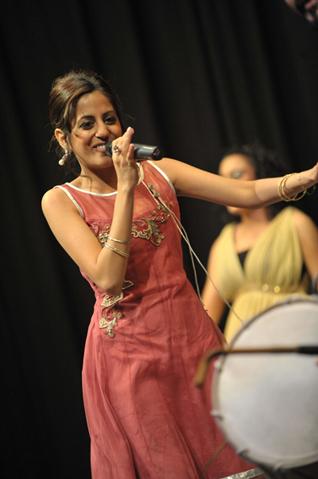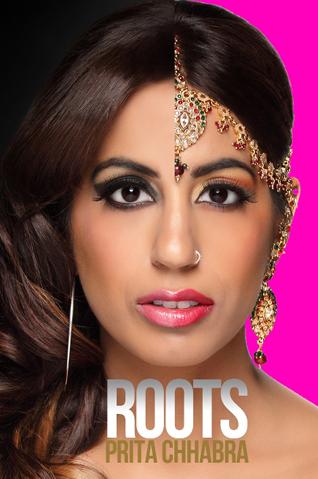Music
R & B Singer Prita Chhabra:
Astride Two Worlds
by TAMARA BALUJA
Prita Kaur Chhabra's fans cannot be blamed if they expect the singer to belt out a Bollywood number.
Prita speaks perfect Punjabi, has dusky skin and heavily kohl-lined eyes. The only problem? She sings R&B (Rhythm & Blues) music in English, so when she released her debut CD, Spread the Word, two years ago, audiences weren't sure how to react. She only sold about 1,000 copies.
"I got a lot of criticism that I wasn't ‘Indian' enough and that hurt a lot," she said. "I was told I should at least have some Hindi lyrics or wear Indian clothes, like a sari."
One fan even suggested that if she was going to perform in English, she should change her name from Prita Chhabra to something more 'Canadian.'
"She said, ‘if you don't want to do something Indian, why don't you just change your name?'" Prita said.
In Britain, Sikh and Punjabi musicians, like Jay Sean, M.I.A. and Apache Indian, have found mainstream success. But in Canada, Prita is one of the few South Asian singers trying to move away from her community's expectations.
Now, she's hit back at her naysayers with a new single, Roots, which came out May 1 - just in time for South Asian Heritage Month and Desifest, one of Toronto's biggest South Asian festivals.
"This is my answer to them: While I'm definitely Canadian and like singing in English, I haven't forgotten my [Punjabi] roots either," she said. "And honestly, why can't I be both? ‘A mixed-up girl in a mixed-up world,'" she says, quoting one of the lines from her song.
The single's CD cover reflects the split between her Canadian and Punjabi halves, depicting Prita's face divided in two: the left-hand side has fashionably loose curls and minimalist western makeup; the right-hand side has her hair neatly pulled back and she is wearing heavy Punjabi jewellery, including a typical nose ring.
Younger audiences, where Prita has a big fanbase, get that duality, said her manager, Raoul Juneja. "She is the new generation of South Asians, born and raised in North America, but still incorporating influences of their [Punjabi] culture into their daily lives," he said.
It's the older audiences hanging on to the familiarity of their Bollywood culture who are usually most resistant to Prita's music, he said.
Western audiences, too, were not an easy market for her crossover appeal, given that she likes to incorporate some Punjabi elements into her music, such as the dhol, a bhangra percussion instrument.
"South Asian artists have generally only succeeded in the mainstream by assimilating entirely and not bringing any noticeable [Punjabi] influences into their music on a consistent basis, so it's definitely been a struggle selling Prita without being told she'd be a better fit for ‘ethnic' events," Juneja said.
Hunsdeep Singh, radio host at CHIN-FM in Ottawa, says it's the South Asian community that has to help launch artists such as Prita Chhabra. "To be a South Asian doesn't mean just one thing," he says. "There's a whole spectrum between those who stick to their traditional culture and sing just Bollywood songs ... and those who have adapted more to Canadian culture. We need to celebrate the whole range."
As one of the organizers of Vaisakhi on the Hill and Ottawa South Asian Festival, Hunsdeep Singh brought Prita to headline at the events in 2009 and 2010.
He vividly remembers the confusion on some faces in Ottawa when they heard her sing for the first time in English without any Punjabi elements. It was a different story as soon as she started incorporating more Punjabi sounds.
"All of sudden, you would see the people moving their shoulders to the dhol beat and dancing, even though she was singing exactly the same thing," Hunsdeep said, laughing. "Somehow the dhol makes it better (for them), it's familiar and the response was even bigger and better."
For Bunny Panesar, Prita Chhabra's dhol accompanist, it was the fact that she only sang in English that got him excited.
"It was a chance for me to show the world that the dhol can be used in western music well - to get more exposure in the Canadian audience," he said. "We needed to do a lot of experimenting to make the heavy dhol beat work with her western music, but we eventually found a way to keep it true to her style."
Prita Chhabra remains hopeful mainstream success in Canada will come. She is gearing up for CD launches across the country and will be performing at various events, including the International Indian Film Academy Awards, Bollywood's version of the Oscars, in June.
"But if I make it big, it will be on my own terms - a little desi, a little Canadian."
[Courtesy: Globe and Mail. Edited for sikhchic.com]
May 18, 2011
Conversation about this article
1: Cliff Blanchett (San Luis Obispo, California, U.S.A.), May 22, 2011, 7:33 AM.
I think she'll be fine and I think it's terrible to say the only thing 'wrong' is that she sings in English? Is that what you said?






